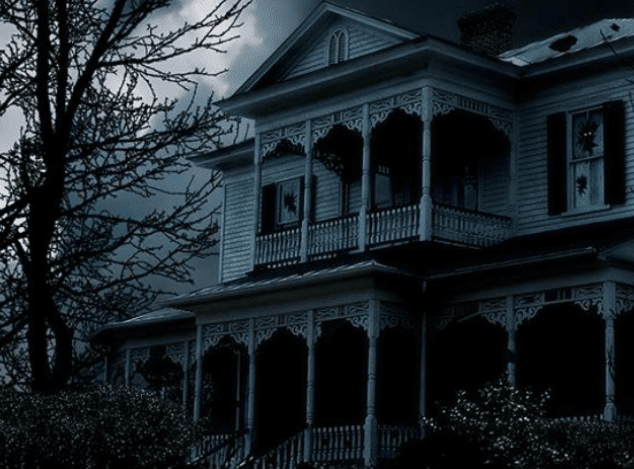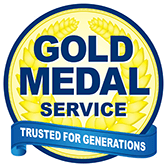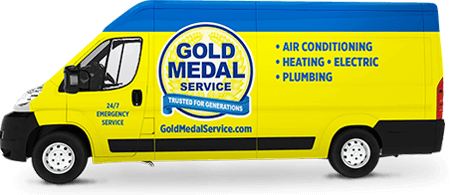
Is your house haunted? Are floors creaking, loud banging, cold spots, and strange sights and sounds?
During the fall months, and especially around Halloween, you may be hyperaware of strange activity in your home. Unexplained noises, flickering lights, and ghastly smells can put anyone on edge. But before you call a medium and cleanse your home with sage and holy water, inspect your home for these real-world haunted house causes.
Haunted House Causes & Fixes
1) Cold Spots
If you watch haunted house and ghost shows, then you know that cold spots can indicate a ghost. You may not be able to see them, but when you come into contact with one, you can feel a cold and spooky sensation causing your hair follicles to stand upright.
Don’t automatically assume that you have a ghost (or ghost family) making themselves at home. Instead, investigate the area around the cold spot for any drafts or air leaks. Many times, cold spots are found around windows and doors that leak cool air from the outside.
To detect leaks (and potentially cleanse the area if it is an actual ghost!), light a piece of incense (or sage) and hold up the smoke around the perimeter of nearby windows and doors. If the smoke begins to move erratically, then you probably have an air leak. You can also hold your hand up to potential air leaks to see if you feel air movement with your hand.
According to the U.S. Dept. of Energy, these are the most common air leak trouble spots in the home:
Here are some tips for how to get rid of cold spots in your home:
- Make sure all HVAC vents and registers are fully open and unblocked. It doesn’t save you any money or energy to close vents in unused or partially used areas of the home, and it can also cause damage to your HVAC system, ductwork, and cause hot/cold spots in the home.
- Contact a professional HVAC technician for an energy audit. They can test your home for air tightness using a blower door test. This is a quick and easy way to find the most significant air leaks in your home.
- Close up all of the air leaks around your doors and windows by adding/replacing weatherstripping, door sweeps, and weatherproof caulk.
- Go around your home and use caulk and expandable foam spray around where utilities (plumbing and electrical) go through walls, floors, ceilings, and soffits over cabinets.
- Install foam gaskets behind all of your electrical outlets and switch plates.
- If you find dirty areas around your attic insulation, that is a clear indication of an air leak nearby. Learn more attic air sealing and insulation tips.
- Periodically inspect your dryer vent and make sure it is not blocked by built-up lint, bird nests, snow, or debris. Clearing and unblocking your dryer vent will save you money and prevent a potential fire.
- If you have a fireplace, make sure the flue is tightly sealed when not in use.
- Never use regular caulk around heat-producing flues and heating equipment, such as fireplaces, chimneys, furnaces, and water heater vents and flues. Contact a professional for help sealing around heat-producing equipment.
In addition to getting rid of spooky cold spots in your home, sealing home air leaks will save you a lot of money on your HVAC bills, by far your home’s largest energy expense.
2) Loud Banging, Popping, and Booming Noises
Halloween and the fall season usually goes hand in hand with first turning on your heating system. Unfortunately, furnaces and ductwork can cause a lot of strange and frightening noises, such as banging, popping, and booming.
You can avoid most frightening furnace noises by scheduling a fall furnace tune-up before you first turn on the system. This will ensure that your heating system is clean, safe, and efficient for the fall and winter seasons.
One really scary sound is a loud and booming explosion. This can happen gas builds up as a result of dirty furnace burners. When the furnace finally ignites, a loud bang or explosion can be felt throughout the home. For obvious reasons, this is damaging and dangerous. Turn your furnace off immediately and contact a professional HVAC technician as soon as you can. Do NOT turn the furnace back on until a professional has deemed it safe to do so.
Another common furnace sound is metallic clanking and scraping. This usually means that there is a loose metal component somewhere in the system. Many times it is a loose blower wheel that needs to be repaired or replaced. If you hear metal against metal, turn the system off and contact a professional right away.
A third common noise you may hear coming from the furnace is screeching, squealing, or whining. This is often caused by loose or aging blower belts (for belt-driven systems), unlubricated moving parts such as shaft bearings, or a malfunctioning blower motor/wheel. While less serious than the previous two noises, you still don’t want to ignore these furnace sounds. Contact a professional to make the necessary repairs or adjustments.
You may also hear strange sounds coming from your ductwork, such as oil-canning, popping, or banging. Contact an HVAC professional for noise dampening solutions
Again, you can avoid most of these noises by remembering to schedule fall furnace maintenance before you first need the services of your heating system.
3) CO Hauntings & Hallucinations
Do any of these symptoms sound familiar?
- Nausea
- Dizziness
- Confusion
- Blurred Vision
- Visual and Auditory Hallucinations
All of these scary symptoms can be the result of lack of oxygen from carbon monoxide (CO) poisoning. Since your red blood cells absorb carbon monoxide faster than oxygen and can block the pathway for new oxygen to enter, you may experience things that seem supernatural.
When fuel is burned, carbon monoxide is produced. While ventilation systems for your fireplace and heating system can improve your indoor air quality, CO leaks can lead to dangerous conditions and even death. In order to prevent CO leaks in the home, it’s important to test CO (and smoke) detectors every 30 days and remember to schedule annual heating and fireplace maintenance every year.
4) Running Water, Dripping, and Banging Pipe Sounds
First, check if you have a leak. Around 10% of all U.S. homes have water leaks that waste 90 gallons of water or more every day. But, wait until daylight first.
While some water leaks are easy to fix yourself, such as a running toilet, others are much more difficult to pinpoint and fix. It may be time to call a plumber.
If you hear a loud thump that reverberates throughout the house or banging noises in your plumbing system, you may be hearing “water hammers,” also known as “hydraulic shocks.” This happens when there is a sudden opening or closing of water supply lines. Sometimes it occurs when a washer changes cycles or a valve is rapidly turned on or off. Not only can it be scary, it can also be extremely damaging as well.
The best way to stop water hammer and banging pipes are with a water hammer arrester. Call your plumber for professional water hammer arrestor installations.
5) Sickly Sewage Smells
If you smell something sickening, it could be coming from one of your seldom-used bathtubs or sinks. The P-trap is meant to block noxious sewer odors from rising up through your pipes and into your home. It only works, however, when there is enough water in the P-section to create a seal. Otherwise sewer gas can enter.
The water in the P-trap can evaporate and dry out, clearing the way for nasty smells to come wafting into your home. This normally happens after about 3-5 months of non-use. In order to prevent P-traps from drying out, run water down all of the drains in your home at least once a month. If running the water doesn’t prevent the smell from coming back, you could have a leak or some other problem that is preventing the seal from working. Contact a professional plumber if this is the case.
If the sickly smell is coming from your garbage disposal, it may be time for a good cleaning and deodorizing. To keep your garbage disposal fresh, periodically grind up some ice and citrus wedges (lemon or lime).
Rule Out the Rational First
Before you call the paranormal investigators, contact the experts at Gold Medal Service. Of course, if you think that there is a serious risk, such as gas or carbon monoxide leaks, evacuate the home immediately and call 911 or your local gas company.
In order to prevent a “haunted house” and associated costly problems, contact Gold Medal Service to diagnose the situation. While we don’t have any mediums or Ghostbusters on our team, we are very familiar with “haunted houses” and can provide solutions that are backed by our 100% Satisfaction Guarantee.
We offer complete HVAC, electrical, and plumbing services (including maintenance, repair, and replacement) throughout New York and New Jersey.


